Gateway NV58 (Intel) - OS Benchmarks
Wrapping up our look at OS performance on the NV58, we have our OS boot/shut down, hibernate/resume, and sleep/wake test results. As with the NV52, there was a fair amount of variability between test runs. We took the best result of numerous runs for each OS. Once more, note that Windows XP will have an advantage in the hibernate/resume testing because we are using a 32-bit OS (3GB addressable RAM) instead of a 64-bit OS (4GB addressable RAM). No OS wins - or loses - in every single category, but Windows XP and Win7 are usually near the top and Ubuntu and Vista are near the bottom.
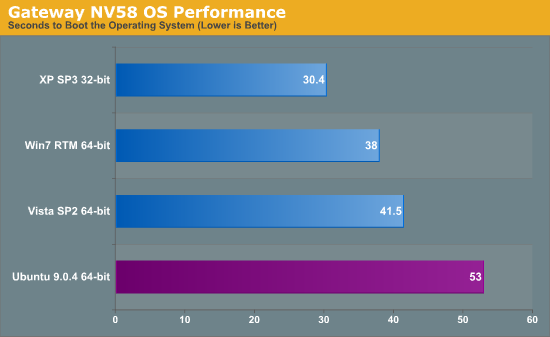
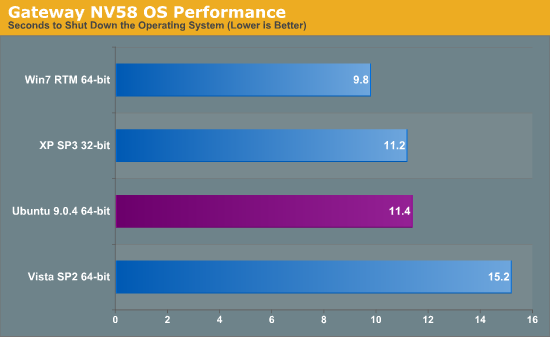
XP loads the fastest once again, this time leading the competition by a larger margin than on the NV52. Windows 7 takes 25% longer to boot, Vista takes 36% longer, and Ubuntu is in last at 74% longer than XP. The GRUB delay is a large portion of the poor showing for Ubuntu, though; it would be very close to the Vista result without the extra ~10 seconds. Shut down times new Windows 7 into the lead, with XP and Ubuntu essentially tied at around 15% longer than Vista bringing up the rear taking 55% longer than Win7.
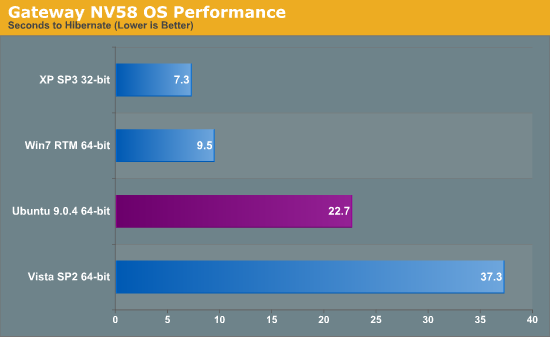
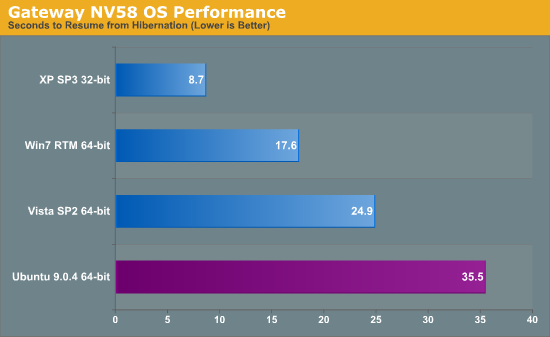
As expected, Windows XP leads in hibernate/resume times since it doesn't have to deal with as large of a hibernation file. Windows 7 trails XP in hibernate times by 30%, correlating very well with the difference in addressable memory. Ubuntu is in third place, requiring over three times as long to hibernate as XP (211% longer). The Vista result is the worst by far, taking 411% longer than XP. There's again the question of whether drivers are somehow at fault, but whatever the cause the NV58 took substantially longer to hibernate on Vista every single time. Resume times don't change the standings much, except Windows XP holds an even larger lead and takes less than half as long as the next closest competitor, Windows 7, which requires 102% more time. Windows Vista doesn't do as poorly in the resume times, though it still trails XP by 186%. Ubuntu is in last place taking just over four times as long to resume as XP, but again the 10 second GRUB penalty is at play.
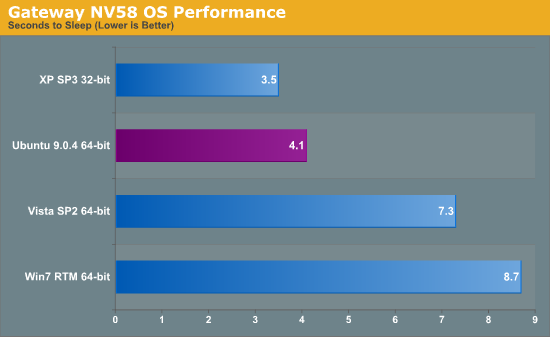
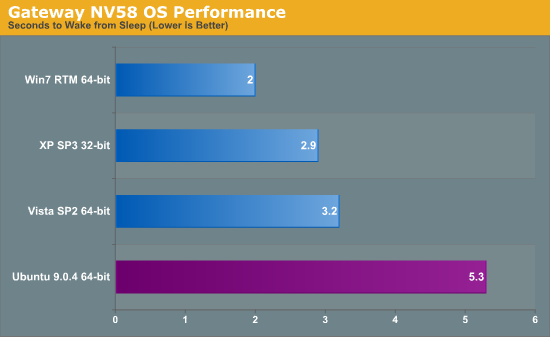
Finally, in sleep times Windows XP again leads, this time followed by Ubuntu which is very close at only 17% longer. Vista takes 109% longer than XP and for once Windows 7 brings up the rear requiring 149% longer than XP to go to sleep. Interestingly, Win7 is the fastest when it comes to waking, requiring just 2 seconds. XP and Vista are 45% and 60% longer, but they're both only around three seconds. Ubuntu is last taking 165% longer than Windows 7, with a result of 5.3 seconds. Since we're dealing with such short times with sleep/wake cycles, the raw percentages and charts aren't nearly as meaningful. As mentioned before, Ubuntu and Win7 tend to be a little more consistent, whereas the best-case results for XP and Vista can be an order of magnitude faster than the worst-case results. If nothing else, Ubuntu is very consistent at going to sleep in around 5-10 seconds; Windows 7 sleep times range from just under 9 seconds up to around 30 seconds, and XP and Vista can take over a minute to go to sleep at times. The difference between 5 seconds and 10 seconds is somewhat annoying, but it's not a huge issue unless you're putting your system to sleep constantly. Occasional delays of over a minute on the other hand can be truly frustrating. For what it's worth, toss in an SSD and the sleep/wake times all appear to be far more consistent (though we didn't conduct in-depth testing on either of these notebooks with SSDs).










106 Comments
View All Comments
nortexoid - Wednesday, September 23, 2009 - link
I'd like to see a test done using "regular" office apps (openoffice, acrobat reader, etc.) and NO internet browsing. (Yes, that's how I use my computer off the plug usually.) It would weed out the performance usage hit taken by Ubuntu when flash is running.It might also be interesting to do a test with tweaked systems, e.g. by tuning Jaunty with PowerTop or similar apps. How does each OS perform when FULLY optimized for battery life (without sacrificing features or much performance, of course)?
7Enigma - Wednesday, September 23, 2009 - link
I know there are users (Jarred apparently you are one of them) that run a system without antivirus/spyware, but you are (or at least should be) in the minority. Linux distro's apparently can get away without it, but on ANY Windows box it's a MUST HAVE. Also disabling those other services (while good at reducing variables) again undermines the system's protection and comparisons to a general usage scenario.In your article I do not think you mentioned what you tweaked (but I could have overlooked this). From my initial impression when reading the article you took both OS' as they were default installed and then tested from there. I think you skewed the results badly in the favor of the Windows platforms by doing this, and I say this as a Windows-only user (never used Linux in any flavor). The first thing I do after a fresh install (still on Vista) is turn off all of those programs you did, along with a host of other services/eye candy using BlackViper's Vista Tweaks. This significantly speeds up the OS in all aspects but can hardly be considered most users configs.
At first reading these comments I was firmly on the "sour grapes" to all of the Linux users complaining about what distro was used, or why X wasn't tweaked by going to a website and reading a tech article, but now I kind of agree with them. Your experience with Windows and lack of experience with Ubuntu had you setting up one for failure before the first test was even run.
Either you test both OS' as they are default installed (driver incompatibilities aside), or you need to have a Linux semi-guru set up your Ubuntu box. My recommendation is the former, as the latter has so many variables it's probably not worth testing in the first place.
Aside from the Ubuntu portion I enjoyed the article. It was very interesting to see how the different power profiles jockeyed for position. I would like to second an earlier commment that asked for idle time to shutdown numbers. Let's be honest, most of us are not going to surf continuously from 100% to dead battery. Rather we are more likely to use the laptop for a bit and then walk away, and come back later. It also will give a good indication of those background tasks impact on battery life (if you don't disable them in your config). I have a sneaky suspicion XP might look very good as it seems to be quite a bit more bare-bones than Vista/7.
Thanks again.
code65536 - Tuesday, September 22, 2009 - link
An Intel engineer explained it some years ago in a blog posting: XP's max battery basically throttles the CPU's frequency down all the time. For example, on my Core2Duo, it'd mean that the CPU will operate at 800MHz all the time, even when it's busy. On the other hand, if Windows gives Speed Step a free hand and lets Speed Step determine the speed, then the CPU will operate at 2GHz when busy, and slow to 800MHz only when it's idling. According to this Intel engineer, it makes no sense to have it always throttled to 800MHz, because that means that tasks will take longer to finish, and the CPU will spend less time idling (which is when the CPU *really* saves power), and he labeled the max battery mode as the "what the hell are you doing?" mode.Drizzt321 - Tuesday, September 22, 2009 - link
I completely understand your complaints on the length of time required to run the test, plus recharge the battery. Have you considered buying a 2nd or 3rd battery and finding an external charger? Or would that kill the results of the test because the battery would be different?PepperPot2 - Tuesday, September 22, 2009 - link
I fail to believe you included the default grub time in the boot as this to do so would be unrepresentative of real use. Who would sit there and wait for it to time out rather than just press the enter key triggering the boot process? Anyway a default install of ubuntu (where it is the only OS on the machine) doesn't show the grub menu, only a 2 second alert to allow you to bring it up if you want. I then immediately boots.My experience with ubuntu is totally contrary to the conclusions you just posted about speed. We've have ~20 installs of Ubuntu 9.04 at work on old machines (7 yrs old) to a machine I built 1 month ago. In all instances the staff find it it is smoother and quicker to use than the dual boot copy of vista or XP.
The boot time on XP is clear nonsense, when ubuntu boots to the desktop you can use it almost immediately. XP is typically totally unusable for ~30 seconds while it loads more crap in the background. Vista is worse.
jasperjones - Tuesday, September 22, 2009 - link
That's true, XP and Vista are pretty unresponsive for a minute or so after boot on your average entry-level laptop. OTOH, Ubuntu is snappy once you see the GNOME desktop. 9.04 is called jaunty ducy ;)However, the same can be said of Win 7. It keeps loading stuff after you see the desktop, but that doesn't make the system feel sluggish--not at all
JarredWalton - Tuesday, September 22, 2009 - link
The Windows boot times are stopped when I see the default system try icons appear (WiFi connectivity, volume, etc.) so the system is pretty much usable at that point. As for GRUB, it's a 2 second timeout, which I could bypass by pressing enter twice, but that still leaves around 8 seconds from the POST to the point where it looks like Ubuntu is actually loading. What's going on during that time? If we subtract POST times, then Ubuntu would look even worse. I can see about tweaking GRUB to skip straight to loading the OS and see if that helps as well... when I get time.jasperjones - Tuesday, September 22, 2009 - link
FYI--one can simply configure GRUB to not wait for user input by editing /boot/grub/menu.lst and changing the second or third line from "timeout x" to "timeout 0"But I generally completely understand the argument not to change too many things from the default installation of Ubuntu, as it's doubtful that the average user would do it.
maveric7911 - Tuesday, September 22, 2009 - link
I would love to see a properly installed and setup distribution of linux in this review (not bashing love that you included linux at all). As others stated above Archlinux would be a pretty good choice. All packages come optimized and things like native 64bit flash and other native 64 bit applications are apart of the stable repository "no adding repos necessary". Also as mentioned, not using the hardware accelerated driver of ati or nvidia will take a big hit on power right away. I'm always available to assist with any linux testing and/or questions.HP
Sr Linux Engineer
andrewaggb - Tuesday, September 22, 2009 - link
What I would like to see is Jared run all the tests on his version of Ubuntu, then let a linux expert have some ssh love to tweak it all up, and then let Jared run the tests again and see how much difference he finds.